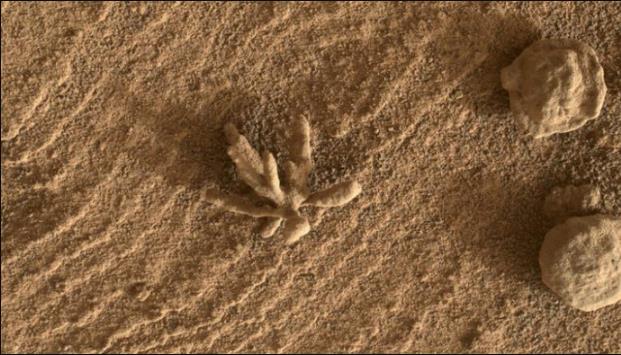美国宇航局的好奇号探测器近日拍到了一张有趣的照片,照片上是一块状似花朵和珊瑚的小石头。美国宇航局指出,这朵“花”可能是水中矿物凝结而成的。
During its ongoing investigation of Martian rocks in Gale Crater, the Curiosity rover stumbled on a tiny surprise. The rock artifact, which resembles a piece of coral or a flower, is smaller than a penny.
好奇号探测器日前在火星盖尔陨石坑内的岩石上探查时,无意中遇到了一个小惊喜,发现了一块状似珊瑚或花朵的石头,体积比一美分硬币还要小。
The Martian "flower" and the spherical pieces next to it were likely "made in the ancient past when minerals carried by water cemented the rock," according to NASA.
美国宇航局称,这朵火星上的“花朵”和附近的几块球状石头可能是“远古时期水中矿物凝结成的石头”。

Curiosity took an image of the little rock arrangement on February 24 using the Mars Hand Lens Imager, a camera located on the end of its robotic arm.
2月24日,好奇号用机器手臂末端的火星手持透镜成像仪拍下了这几块小石头。
Previously, the Opportunity rover also spotted Martian "blueberries," little mineral spherules indicative of once watery soil on the red planet.
先前,机遇号探测器还曾在火星上发现过“蓝莓”,那块球状小矿石表明火星上曾有过潮湿的土壤。
Early on, Curiosity discovered the chemical and mineral evidence affirming the planet's habitability sometime in its distant past. Ever since, Curiosity has been investigating the geologic record to understand when Mars might have been most suitable to host life.
早些时候,好奇号在火星上发现的化学和矿物证据证实了在遥远的过去,火星曾经是宜居星球。自那以后,好奇号就一直在调查地质记录,以弄清火星何时最宜居。
The car-size rover paved the way for the Perseverance rover and Ingenuity helicopter, which are currently exploring Jezero Crater, located 3,700 kilometers away and will eventually return the first Martian samples to Earth through future missions. The combined efforts of these rovers could help answer the ultimate question of whether life ever existed on Mars.
大小和汽车相当的好奇号探测器为毅力号探测器和机智号直升机铺平了道路。毅力号和机智号目前正在3700公里开外的耶泽罗陨石坑开展探索工作,并将在未来的任务中把第一份火星样本送回地球。这些探测器的协作将有助于回答火星上是否曾存在生命这一终极问题。







